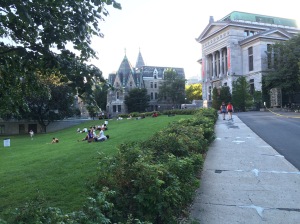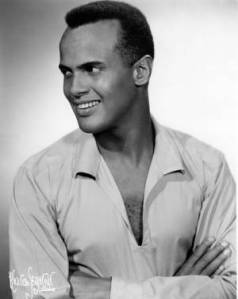
When I went to McGill I was poor. Oh I was not wretchedly poor or chronically poor. I just didn’t have any money at the time. (I lived in the women’s dorm, so I didn’t go hungry.) I expected that one day I would have enough, so it was okay.
I was at McGill because of a fourth grade teacher whose name I don’t even remember. She had sent a letter to my mother asking her to come to the school for a conference. My mother never went to conferences for me. “Why should I go to the school to see Margaret’s teacher? She never gets in trouble.” But the teacher informed her that I had done well in some standardized tests and, when I got older, I must go to a university.
“Seems like an odd reason to call us to the school. Just to tell us she’s smart. We don’t have the money for university.” And so they said to me, “Margaret, your teacher says that you have to go to university when you get big. We don’t have that kind of money, so you’ll have to figure out how to pay for it yourself.”
Years passed and their order stuck. Luckily colleges were still giving out big academic scholarships at the time. I got one that paid for tuition, books, and room and board—but not much else.
The first term was especially hard. I’d gone to the Banff School of Fine Arts to study university-level French (handy if you plan to go to university in a French-speaking province). Fun, but it meant that I didn’t have much time to earn spending money.

Sad. Missed Harry Belafonte.
A girl wants to go out with friends once in a while, share a pizza, or buy a coke from the coke machine, and there was usually not enough money for any of those. Most tragic in my young heart: Harry Belafonte came to Montreal, all my friends went to see him, and I could not. (Actually, I still feel sad about that.)
Many years later, when she was dying, my mother scolded me. “You never told us you needed spending money in college. If you had told us, we would have sent you something.” Too late Mom. I was a literal-minded kid who never knew that there was some flexibility in our family’s budget. I’d never forgotten what I was told in the fourth grade.
My friend Emily, from Loudonville, near Albany, was determined that my relative poverty would not interfere with our friendship. We would find things to do together that didn’t cost money. On Sundays the university library was closed. Most everything was. But Emily was Jewish and there was a Jewish library in Montréal, open on Sundays. We could study there. We’d catch a city bus and walk a couple of blocks in a nice residential neighborhood.
 Lunch time, we’d walk to a little Jewish restaurant nearby. Emily, the tiniest girl in the women’s dorm, would order a gigantic lunch: a tall glass of milk, a hearty sandwich, dessert. I would always order homemade chicken noodle soup (at twenty-five cents the cheapest thing on the menu) and a glass of water. I’d open the two packets of saltine crackers and put both in my soup.
Lunch time, we’d walk to a little Jewish restaurant nearby. Emily, the tiniest girl in the women’s dorm, would order a gigantic lunch: a tall glass of milk, a hearty sandwich, dessert. I would always order homemade chicken noodle soup (at twenty-five cents the cheapest thing on the menu) and a glass of water. I’d open the two packets of saltine crackers and put both in my soup.
The middle-aged woman who waited on us watched this routine for a couple of weeks. One day, after serving me soup, she came back to the counter with her two hands full of saltine crackers. She dropped them beside my bowl.
“Take them,” she said. “They’re free.” I did.
By early December of my first year, my lack of money was a problem. I was expecting the next installment of my scholarship money, and it hadn’t come in. I had exactly thirteen cents to my name. I couldn’t afford to buy Christmas gifts for my family.
“Let me lend you some money,” Emily said.
I refused. I was determined to be poor but proud.

I had only thirteen cents to my name, and I had runs in my stockings. Not nearly enough, even then, for a new pair of nylons. I wasn’t permitted to wear slacks. At McGill, at the time, women living in the women’s dorm could only wear slacks on Sundays or to go skiing. We wore skirts, nylons, heels six days a week.
“In the States, everybody wears bobby socks,” Emily told me. She implied that Canadians were more than a little behind the times. No matter. Skirts, heels, and nylons with runs would have to do.
Then came my holiday miracle. I got a formal letter, on letterhead, from the Masons of Montreal. It seems that every year they gave a scholarship to a deserving student and that year, they were awarding it to me. What luck! Remarkable since I had never applied and knew nothing at all about the Masons. But if ever an award came in handy, that was it. Fifty dollars. Enough to buy gifts, stockings, and tide me over till the installment came.
Christmas break came. Everyone in the dorm went home except for me and the eight girls from Hong Kong. They always sat at a table for eight and spoke only Chinese and only to each other. I sat at another table alone. My parents never found out that everybody else went home for the break; I never told them. I had no money for the long train trip home to Alberta.
On Christmas morning I was alone in my wing of the dorm. I unwrapped my presents,  dumped the contents of my stocking—the nuts, candy, orange, apple, fashion magazine, and fingernail polish on my desk. My mother had forgotten that I didn’t have a nutcracker, so I smashed the walnuts with my shoe and felt very much alone.
dumped the contents of my stocking—the nuts, candy, orange, apple, fashion magazine, and fingernail polish on my desk. My mother had forgotten that I didn’t have a nutcracker, so I smashed the walnuts with my shoe and felt very much alone.
 There were no meals served Christmas day. The dining staff had been given the day off. Most of the restaurants downtown were closed for the holiday. I bundled up and plowed through a bitterly cold wind, with my boots crunching in the snow, and ate lunch in a deli on Saint Catherine’s Street.
There were no meals served Christmas day. The dining staff had been given the day off. Most of the restaurants downtown were closed for the holiday. I bundled up and plowed through a bitterly cold wind, with my boots crunching in the snow, and ate lunch in a deli on Saint Catherine’s Street.
I’d been invited to a woman’s house a long walk away for a traditional dinner. Every Christmas she invited international students to her home. A mix of young men from around the world—and me. I was terribly shy, but not so shy that I had to walk home alone.

After Christmas my friend Emily had invited me to spend a few days at her house in Loudonville, near Albany. I was nervous. I didn’t know whether it was polite to let her parents pay for the treats she’d planned for me: a make-your-own sundae at Stewarts, a trip to the State Capital to hear Rockefeller, a trip to a shoe store where, unlike old-fashioned Canada where salesman brought shoes for one to try on, hundreds of pairs of shoes were lined up on racks. So much more up-to-date, Emily assured me.
I’d brought what I hoped was an appropriate gift for Emily’s mother, a bone china cup and saucer. At least in those days, every Canadian woman I knew collected cups and saucers and they didn’t have to match. By some extraordinary coincidence, Emily’s mother collected that very pattern. I was relieved. Maybe my gift was ok.
Both of Emily’s parents were lawyers and her mother was also a novelist. Apparently her mother’s hobby was sewing bathrobes. Privately I thought it odd. At the time, I didn’t own one. Emily’s mother opened up a trunk and inside were twenty-four bathrobes she hadn’t found anyone to give to. I was offered the bathrobe of my choice. I thought about it. It seemed okay to take one because she had so many. They were all made from the same pattern: a roomy kimono and not, I noticed, particularly well-made. My mother sewed very well, and she’d taught me to sew too. For a bathrobe, it didn’t really matter. The bathrobe I chose was a many-colored horizontal striped corduroy bathroom with two huge pockets. I wore it for years and years and years. It was practical and comfortable and colorful.
 The evening before we left to go back to college, Emily’s dad showed us some special memorabilia in their basement family room. It seems that Emily’s father had been active in the local Masons for a very long time. What a coincidence! It was the Masons in Montreal that had given me the money that had taken me through the month of December, that had let me buy gifts for my family, a smoked meat sandwich in a Jewish deli for lunch on a bitterly cold Christmas day, nylon stockings and more.
The evening before we left to go back to college, Emily’s dad showed us some special memorabilia in their basement family room. It seems that Emily’s father had been active in the local Masons for a very long time. What a coincidence! It was the Masons in Montreal that had given me the money that had taken me through the month of December, that had let me buy gifts for my family, a smoked meat sandwich in a Jewish deli for lunch on a bitterly cold Christmas day, nylon stockings and more.
For years I didn’t make the connection between Emily’s father and the Masons of Montreal. I suppose it was too embarrassing for me to think I’d been the object of Emily’s family’s charity.
Now, of course, I am certain that Emily Champagne’s family found a way to give me the money that I badly needed but was too proud to accept. What extraordinary kindness.
**********************************
Copyright December 11, 2017

Glad to see you’re back in harness. Keep it coming.
Love,
Herb
I’m glad to be back. Watching the news had drained me of all energy. Hope to see you both soon.
So lovely. I cried reading your story because I have been living close to the bone and can relate.
I am in a play about how we Women got the vote in America. It is called, We DiD It For You. The playwrite Thea Iberal uses non-actors to speak the Women’s part, and we are feeling grateful for the opportunity. That is how I started to be on stage. I usually tell short stories in a circle with my listeners. I am telling you this because there is a lovely woman who has joined us. She is a happy soul, and her last name is Champange. Maybe she know Emily. Story Magic can be so wonderful. I will ask her where she hails from. Just wanted you to know that it is even easy for a native American to feel out of the loop. I am grateful for the minimalist movement. I grew up with Less is More…and that is the way it is for many, even those of us who have retired from professional careers. Blessings. Nyanna
Thank you, Nyanna. I too like the Less is More way of life. (It’s especially handy when living close to the bone.)
Just WONDERFUL!!!! Oh I just love it. Seeing you as this vulnerable girl not believing there was any money to ask for. I didn’t have much myself, but my mother had taught me to use a check book and I opened an account at Stuyvesant Plaza. That’s where I purchased my first (and last) college “outfit” – it was a plaid skirt I LIKED and a cute blouse… but I soon saw the skirt especially in 1970 was WAY out of college grunge jeans style. Funny that I had brought to college a patchwork dress (more like a night dress!) that I had made for college, but wasn’t wearing to sleep in, so I walked across campus in it one fall day, on the way to an inter sorority council meeting, and I caught the eye of boy. He thought it was cute. Many years later he gave me the golden boy who is now Brian Schwartz. Isn’t life just full of surprises? Thanks for this fun and vivid story.
Thanks Marni. Love your college fashion stories.
Amazing what we can survive! Toughing it out! I could just cry about your “not-so-merry Christmas” then, Margaret. And cheer you for your grit! You and I made it out of poverty and loneliness and the specific circumstances you describe. (Those runny nylons!) The world should have gotten better by now. But….More crying necessary… More hope and faith and people of goodwill, like Emily’s family.
Sigrid, it’s been too long since we talked. Miss you and your wisdom and great heart.
I’m so glad to have discovered your blog and your no-so-merry Christmas story. I admire your strength and independence that got you through those dfficult days. That Masonic Mitzvoh was a perfect touch for your life and your story. I look forward to catching up on the blog and following it forward.
I’m so glad you found my blog too. Hope to see you soon.
Lovely story. Reminds me of how the ladies in my college cafeteria would give me extra food and allowed me to put many of my meals, “on my tab” so I could eat lunch that day. When I returned to pay my bill, no one could find it. Sweet Angels one and all.
April, I love your story. As you say, sweet angels one and all.
Love your story Margaret and think it’s so relatable for many of us. But what I liked the most is that after hearing you “tell” I could hear your voice with its nuances and gentle humor as I was reading. This is a time that we all need some kindness.
Oh yes, we do need kindness these days. Thanks, Linda.
Hi, Margaret – An engrossing story! Weren’t we lucky that there was scholarship money in those days? I will always admire Gov. Rockefeller for what he did for education in NYS. The Regents scholarship paid for half my schooling. Your story reminds me of my husband’s. Ross grew up poor and worked hard from the time he was a small child. His family sold vegetables, fruits and Christmas trees and wreaths. By the time I met him, all the trees had grown too big to sell and yet, every year, Ross scaled one and cut off the top to set up as a Christmas tree for an elderly woman in town. She always wanted this done on the Saturday before Christmas and Ross insisted I come with him. Oh, as his girlfriend, young wife, pregnant wife, mother of one baby, then another, there were a million things I’d rather be doing that day. The old lady insisted on giving us awful homemade Christmas cookies and I talked to her while Ross set up the tree and patiently untangled her lights. It was many years before my husband revealed to me the reason he always set up her tree. Many years ago, he had accidentally discovered that she was the anonymous benefactor who paid for his annual trips to Boy Scout camp. His parents could never have afforded this and it meant the world to him. He felt that he wouldn’t have become an Eagle Scout and the man he was without her gift. She was rich and it may not have meant much to her, but he never forgot it and was glad to see her right for the holidays each year. There was no one else who could bring just the right kind of Christmas tree or set it up in just the right way.
Madelyn, a great story! I especially loved that kindness begets kindness. I’ll always think of those lopped off Christmas trees.
Margaret, Your story is beautiful and proves there is kindness all around us. I hope you are well and wish you and Jay a very Merry Christmas! Daniela and co.
Hi Daniela, I believe there’s more kindness in this world than evil. But we have to recognize it. Thanks for your kind words. Merry Christmas!
Getting what’s needed to where it’s needed, without embarrassing anyone. Perfect.
I have read two articles so far and I really like them, specially the story when you were student in college. I saw your speech
I saw your speech at League Embraces Democracy, I loved it and I decided to read your blog.
I like the way you write stories.
Please keep writing when you. Thank you.